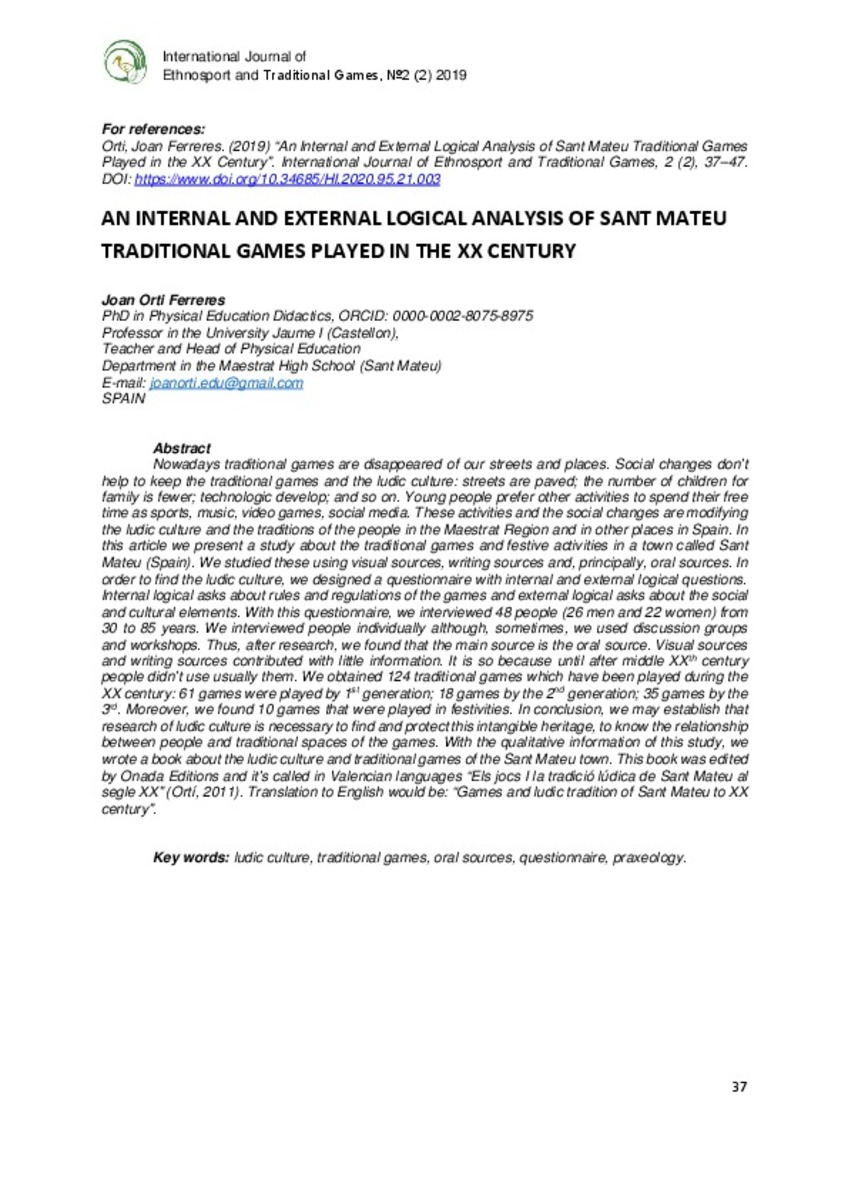Mostrar el registro sencillo del ítem
An Internal and External Logical Analysis of Sant Mateu Traditional Games Played in the XX Century
| dc.contributor.author | Ortí Ferreres, Joan | |
| dc.date.accessioned | 2020-10-19T10:21:55Z | |
| dc.date.available | 2020-10-19T10:21:55Z | |
| dc.date.issued | 2019 | |
| dc.identifier.citation | Orti, Joan Ferreres. (2019) “An Internal and External Logical Analysis of Sant Mateu Traditional Games Played in the XX Century”. International Journal of Ethnosport and Traditional Games, 2 (2), 37–47. DOI: https://www.doi.org/10.34685/HI.2020.95.21.003 | ca_CA |
| dc.identifier.issn | 2686-9314 | |
| dc.identifier.uri | http://hdl.handle.net/10234/190002 | |
| dc.description.abstract | Nowadays traditional games are disappeared of our streets and places. Social changes don’t help to keep the traditional games and the ludic culture: streets are paved; the number of children for family is fewer; technologic develop; and so on. Young people prefer other activities to spend their free time as sports, music, video games, social media. These activities and the social changes are modifying the ludic culture and the traditions of the people in the Maestrat Region and in other places in Spain. In this article we present a study about the traditional games and festive activities in a town called Sant Mateu (Spain). We studied these using visual sources, writing sources and, principally, oral sources. In order to find the ludic culture, we designed a questionnaire with internal and external logical questions. Internal logical asks about rules and regulations of the games and external logical asks about the social and cultural elements. With this questionnaire, we interviewed 48 people (26 men and 22 women) from 30 to 85 years. We interviewed people individually although, sometimes, we used discussion groups and workshops. Thus, after research, we found that the main source is the oral source. Visual sources and writing sources contributed with little information. It is so because until after middle XXth century people didn’t use usually them. We obtained 124 traditional games which have been played during the XX century: 61 games were played by 1st generation; 18 games by the 2nd generation; 35 games by the 3rd. Moreover, we found 10 games that were played in festivities. In conclusion, we may establish thatresearch of ludic culture is necessary to find and protect this intangible heritage, to know the relationship between people and traditional spaces of the games. With the qualitative information of this study, we wrote a book about the ludic culture and traditional games of the Sant Mateu town. This book was edited by Onada Editions and it’s called in Valencian languages “Els jocs I la tradició lúdica de Sant Mateu al segle XX” (Ortí, 2011). Translation to English would be: “Games and ludic tradition of Sant Mateu to XX century”. | ca_CA |
| dc.format.extent | 11 p. | ca_CA |
| dc.format.mimetype | application/pdf | ca_CA |
| dc.language.iso | eng | ca_CA |
| dc.publisher | World Ethnosport Society | ca_CA |
| dc.rights | Atribución-CompartirIgual 4.0 Internacional | * |
| dc.rights.uri | http://creativecommons.org/licenses/by-sa/4.0/ | * |
| dc.subject | ludic culture | ca_CA |
| dc.subject | traditional games | ca_CA |
| dc.subject | oral sources | ca_CA |
| dc.subject | questionnaire | ca_CA |
| dc.subject | praxeology | ca_CA |
| dc.title | An Internal and External Logical Analysis of Sant Mateu Traditional Games Played in the XX Century | ca_CA |
| dc.type | info:eu-repo/semantics/article | ca_CA |
| dc.identifier.doi | https://www.doi.org/10.34685/HI.2020.95.21.003 | |
| dc.rights.accessRights | info:eu-repo/semantics/openAccess | ca_CA |
| dc.relation.publisherVersion | http://ethnosport.org/files/q48vvj-ijetg-2-2019-3-orti-eng.pdf | ca_CA |
| dc.type.version | info:eu-repo/semantics/publishedVersion | ca_CA |
Ficheros en el ítem
Este ítem aparece en la(s) siguiente(s) colección(ones)
-
EDE_Articles [411]








